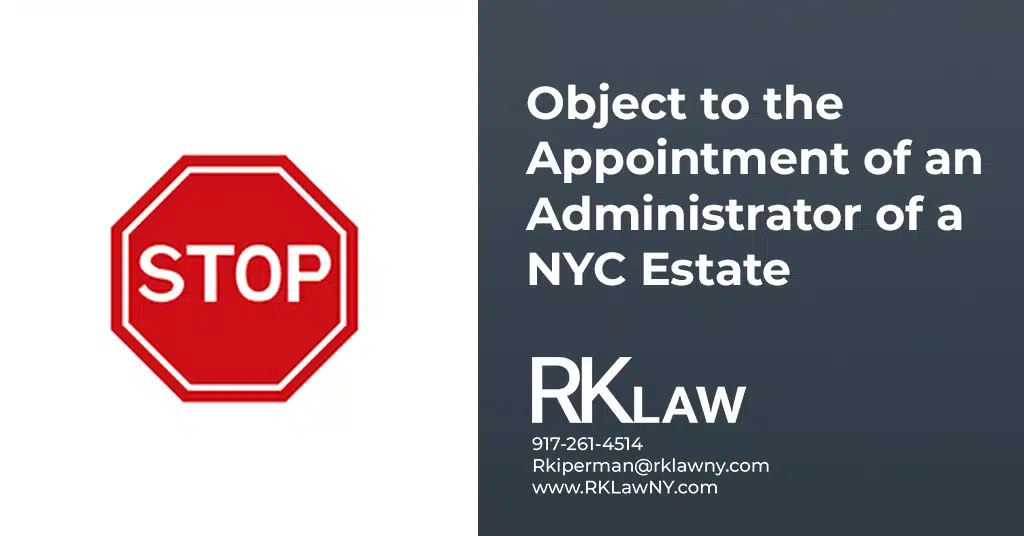Did you know that you can object to the appointment of an administrator of an estate? When a person dies without a Will, the Surrogate’s court will appoint a person to administer the estate. This person is known as an Administrator.
The order of priority for individuals who can serve as Administrator are set forth in section 1001 of the Surrogate’s Court Procedures Act. In general, the Court will give the spouse the first opportunity to serve. After the spouse, the Court would appoint the child or children, then the grandchildren, then the parents, followed by the siblings, and finally an aunt or uncle.
The Court will also appoint a person that is not related to the family when all of the next of kin can agree on said person.
While matters can be simple when people agree, there is also a process for voicing disagreement over the appointment of an individual to serve as Administrator. When there is a disagreement over who should serve as the Administrator, the next of kin have an opportunity to voice their disagreement by filing “Objections.”
How does one Object to the Appointment of An Administrator of a NYC Estate?
There are few ways in which you can object. A person may appear on the return date of a Citation and state to the Court that they object to letters of administration being issued in the estate of the decedent or to the person petitioning the court for letters of administration.
If you appear in Court and tell the Judge that you object, the Court will likely ask you whether you have an attorney. The Court will also direct you to file your verified objections with the Court.
Instead of just appearing in Court and being told to file your objections, you can also just file your Verified Objections with the Court before the return date of Citation.
“Verified Objections” is a document that you can prepare where you state your grounds for protesting the appointment of a certain person as an administrator. The form is called verified because you sign it before a notary.
What are Grounds to Object to the Appointment of an Administrator?
There are several basic grounds for objecting to the appointment of an Administrator. The grounds for objecting are set forth in section 707 of the Surrogate’s Court Procedures Act.
The basic grounds for objecting, therefore, are when the proposed administrator is:
- An infant (under the age of 18)
- An incompetent (there must be a legal or, sometimes, a medical determination)
- A non-domiciliary alien (a Non Us Citizen or Green Card Holder). These individuals cannot serve alone but can serve together with a New York resident.
- One who does not possess the qualifications required of a fiduciary by reason of substance abuse, dishonesty, improvidence, want of understanding, or who is otherwise unfit. (Many objections are filed under this section)
In addition, the Court also MAY decide that a person cannot be a fiduciary when:
- They cannot read or write English
- Is convicted of a felony related to financial crimes or breach of fiduciary duty.
Is there a Cost to Object to the Appointment of an Administrator?
The cost of filing the objections is $75.00. In addition, typically when a person files objections, they will also file a Cross-Petition for Letters of Administration. A cross petition for letters of administration is exactly the same as a regular petition for Letters of Administration except that you write the words “Cross-Petition” on the first page.
What happens After Objections are filed?
After objections are filed, the issue is “joined” and typically the Court will order that a Court conference be held to see if the parties can reach an agreement on the question of who should be the administrator. If the parties can agree, then the parties will sign a Stipulation to this effect. If the parties cannot agree, then the Court will prepare a discovery schedule.
A discovery schedule gives an opportunity for the individuals to learn information that will help them figure out whether the proposed administrator can in fact serve.
After time for discovery has elapsed, if an agreement is still not reached, the Court will hold a hearing to determine who should be the administrator.
Note that when there is a dispute that cannot be resolved by the parties, at times the Court will choose the person who has the most votes from the family provided that the parties cannot otherwise agree.
We can help you Object to the Appointment of an Administrator of a NYC Estate. Contact us to learn more.
For more information, please contact NYC Probate Litigation, Guardianship, NYC Probate and Estate Planning attorney Regina Kiperman:
Phone: 917-261-4514
Fax: 929-556-2089
Email: rkiperman@rklawny.com
Or visit her at:
40 Wall Street
Suite 2508
New York, NY 10005
Visit Regina on LinkedIn
Visit Regina on Facebook
This page is made available by the lawyer for educational purposes only as well as to give you general information and a general understanding of the law, not to provide specific legal advice. By using this site you understand that there is no attorney client relationship between you and the lawyer. The post should not be used as a substitute for competent legal advice from a licensed professional attorney in your state. ATTORNEY ADVERTISING.
